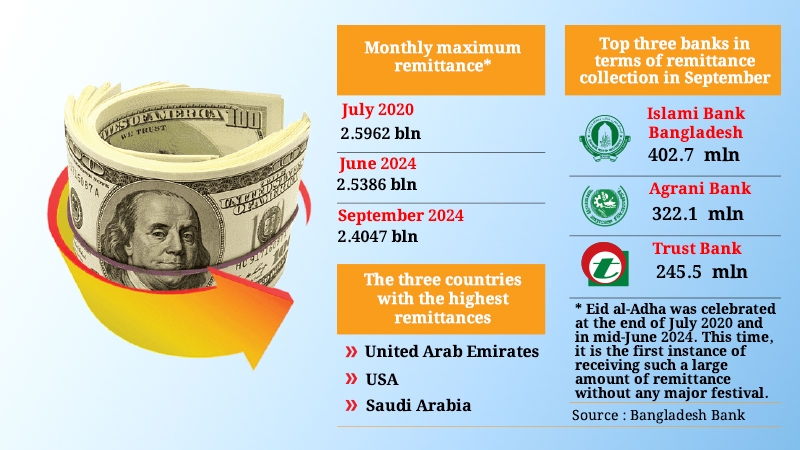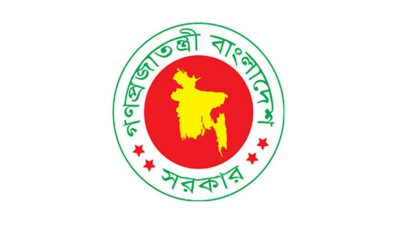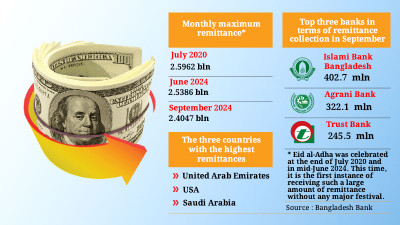 Photo: Bonik Barta
Photo: Bonik Barta After the student-public mass uprising, there has been a
significant surge in the country's remittance flow. In September, Expatriate
Bangladeshis sent a total of BDT 240 crore, or 2.40 billion dollars. In
Bangladeshi currency, this amounts to BDT 28,857 crore. This is the
third-highest remittance in a single month in the country's history. The
Bangladesh Bank announced this information about the remittance flow on Tuesday
(October 1).
Typically, there is a high growth in remittance flow
around festivals like Eid al-Fitr and Eid al-Adha. However, this time,
expatriates have sent such a large amount of money without any significant
festival. A review of central bank data shows that the highest remittance came
in July 2020. During the crisis caused by the coronavirus, expatriates sent a
record 2.5982 billion dollars in remittances at that time. The Eid al-Adha
holiday in that year was from August 1, which played a significant role in the
high remittance flow in July. Following that, the second-highest remittance of
2.5386 billion dollars was recorded in June of this year, including Eid al-Adha
in the middle of the month.
Concerned people say that after the fall of Sheikh
Hasina's government, the vulnerabilities in the country's banking sector have
begun to surface. Several banks are unable to return deposit funds according to
customer demand. Following the appointment of the new governor, the boards of
11 private banks have been dissolved. In this situation, expatriates were
expected to become anxious and turn away from banks. However, the remittance
flow indicates that they have not taken that path. On the contrary, they have
shown more commitment than ever to send remittances through legal channels.
Syed Mahbubur Rahman, Managing Director of Mutual Trust
Bank, said, “The growth in remittance we are witnessing marks the beginning of
a new Bangladesh. Expatriates view the country's mass uprising positively. They
believe that Bangladesh is now theirs, and they need to contribute to its
development. Expatriates are essentially joining the celebration of political
change in the country.”
Syed Mahbubur Rahman believes that the government must be
influential in maintaining this enthusiasm among expatriates. He stated, “If
the country is managed correctly, expatriates will be even more inspired to
send remittances through legal channels. If the country goes off track again,
expatriates will become disheartened. The interim government has promised to
improve service quality for expatriates at the airport. If they receive the
respect they deserve, the growth of the remittance flow in the country will
continue.”
In the face of the mass uprising of students and the
public, on August 5, both the Prime Minister and Bangladesh Bank Governor Abdur
Rouf Talukdar fled. His decisions from a year ago caused instability in the
country's exchange rate. As a result, there was a significant decline in
remittance flow in September 2023, with only 1.33 billion dollars coming through
banking channels, the lowest in the past five years. However, recovering from
that severe downturn, the country received 2.4047 billion dollars in
remittances last month. Compared to the same period the previous year, this
represents an increase of over 1.07 billion dollars, with a more than 80
percent growth rate.
According to Bangladesh Bank data, in the first quarter
of the 2024-25 fiscal year (July-September), expatriates sent 6.54 billion
dollars in remittances to the country. During the same period in the 2023-24
fiscal year, 4.90 billion dollars were sent. Thus, remittances increased by
33.3 percent in the first quarter of the current fiscal year.
Although slightly decreased, Islami Bank Bangladesh PLC
maintained its top position in remittance collection in September, bringing in
402.7 million dollars. The second highest, 322.1 million dollars, was sent
through Agrani Bank PLC. Trust Bank secured the third position, with 245.5
million dollars in remittances received last month.
Muhammad Munirul Moula, Managing Director of Islami Bank
Bangladesh PLC, told Bonik Barta, “Expatriates have been eager to play a role
in the country’s reconstruction. Following the student-led uprising, they are
expressing this through remittances. Since its inception, Islami Bank has been
the country's highest remittance collector. Due to the strong trust of
expatriates, we have maintained that position. I hope the remittance flow
through our bank will continue increasing.”
The largest labor market for Bangladeshis is Saudi
Arabia, which has historically been the source of the highest remittances.
However, for the past two years, more expatriate income has been coming from
the United Arab Emirates. The United States ranks second in remittance inflow,
while Saudi Arabia ranks third.
According to central bank data, the highest remittance in
the country's history was recorded in the 2020-21 fiscal year. During that
year, expatriates sent a record 24.77 billion dollars in remittances due to the
crisis caused by the coronavirus. Before that, in the 2019-20 fiscal year,
remittances totaled 18.20 billion dollars. In the 2021-22 fiscal year, the
amount was 21.03 billion dollars; in the 2022-23 fiscal year, it reached 21.61
billion dollars. In the 2023-24 fiscal year, this flow increased slightly to
23.91 billion dollars.
Officials at Bangladesh Bank state that so far this
fiscal year, an average of over 2 billion dollars in remittances has come in
each month. If this growth rate can be maintained for the remaining months, new
records in remittance flow are expected.






